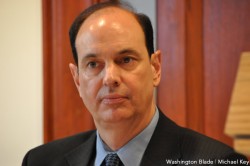National
Sigh of relief as shutdown ends
HIV service providers spared; staffers return to work

Some federal workers are troubled over accusations made by Sarah Palin and others that the U.S. Park Service is being disrespectful to veterans by denying access to monuments in Washington. (Photo by Therealbs2002; courtesy Wikimedia Commons)
UPDATE: The federal government shutdown ended Thursday and thousands of employees returned to work in D.C. and across the country. This story was posted shortly before Congress passed a bill to fund the government and avert a default:
As the federal government’s shutdown entered its third week, LGBT and AIDS advocates expressed alarm that community-based AIDS service providers in D.C. and across the nation could be forced to lay off employees and curtail services if the shutdown and its related funding reductions continued much longer.
Democratic and Republican leaders in the Senate announced a bipartisan agreement on Wednesday calling for raising the debt ceiling and ending the government shutdown. Although political observers thought there were enough votes to approve the agreement in both the Senate and the House, no one was certain whether the GOP-controlled House would pass the compromise bill initiated in the Senate.

Leonard Hirsch (Washington Blade photo by Michael Key)
Leonard Hirsch, president of the LGBT federal workers group Federal GLOBE, said that, like all federal workers, thousands of furloughed LGBT federal employees continued as of Wednesday to struggle without a paycheck.
The shutdown, which closed many but not all federal agencies, left more than 800,000 federal employees furloughed, according to the U.S. Office of Personnel Management. With the federal government being the largest employer in the D.C. metro area, the area is said to have been affected the most by the shutdown.
“Everyone that I know in the federal workforce is very frustrated that they’re not allowed to be getting work done, that things are piling up, that their clients are not being served,” said Hirsch, who has worked at the Smithsonian Institution for 24 years.
Hirsch said he and nearly all the federal workers he knows – LGBT and straight – are especially troubled over accusations by Obama administration critics, including former GOP vice presidential candidate Sarah Palin, that the U.S. Park Service is being disrespectful to veterans and other citizens by denying them access to the World War II Memorial and other monuments in Washington.
“The law is clear,” he said. “If Congress has not appropriated money you cannot work on things and do things. And so we can’t open parks. We can’t open museums and monuments because Congress has not appropriated the money.”
Added Hirsch, “I don’t know a single person at the Park Service who is happy about closing doors, and I know a lot of people at the Park Service…It’s putting the federal worker in this horrible bind to say we can’t do these things and being abused for following Congress’s direction.”

Don Blanchon (Washington Blade file photo by Michael Key)
Don Blanchon, executive director of Whitman-Walker Health, the D.C. area’s largest private agency providing medical and social services to people with HIV and the LGBT community, said Whitman-Walker has “weathered” the federal shutdown so far largely because it accumulated a substantial reserve fund over the past several years.
“By and large, the impact of the shutdown directly on our operations and patient care is minimal,” he told the Blade on Monday. “We’re open. We’re serving patients. And for the foreseeable future we don’t see this shutdown causing us a tremendous amount of difficulty right now,” he said.
But Blanchon noted that Whitman-Walker along with other D.C. community-based health groups serving people with HIV has been hit by D.C.’s inability to pay its Medicaid reimbursements. Under a federal law, D.C. is prohibited from spending its own money obtained through local tax revenue if Congress doesn’t approve the city’s annual budget.
With Congress deadlocked over the federal budget, under which the D.C. budget falls, the city has been unable to spend much of its own funds since the federal shutdown began on Oct. 1 at the start of the new fiscal year. Since D.C.’s budget is intertwined with the federal budget, D.C. has been impacted by the shutdown in a way that no other city or state has, a development that has infuriated D.C. Mayor Vincent Gray.
At an Oct. 11 town hall meeting Gray said the shutdown has forced the city to tap into its reserve funds to keep city agencies open and to continue city services through the end of this week or next, at which time he said the usable portion of the reserve fund would be depleted.
But Gray said the reserve fund wasn’t large enough to enable the city to cover $90 million in Medicaid reimbursement payments to the city’s private clinics and medical providers that take Medicaid patients during the previous week.
Blanchon said the delay in the Medicaid payments resulted in Whitman-Walker not receiving about $70,000 in reimbursements for its Medicaid patients.
While Whitman-Walker’s reserve fund will enable the LGBT health provider to “weather the storm” for the time being, as Blanchon put it, other community-based health providers don’t have such a financial cushion, officials with those groups have said. Some of them have already been forced to lay off employees and curtail services, including HIV-related services, the officials have said.

Ruby Corado (Washington Blade file photo by Michael Key)
“We’re already seeing services cut back for LGBT and Latino community clients,” said Ruby Corado, director of the LGBT community center Casa Ruby. Corado said Casa Ruby, which is funded largely by private donors, wasn’t immediately affected by the shutdown.
Ron Simmons, executive director of Us Helping Us, a D.C.-based HIV service provider that reaches out to black gay men, said his group has also managed to get buy for the past two weeks “without any noticeable impact.”
But Simmons said Us Helping Us won’t be able to operate without possible service interruptions if the federal shutdown continues indefinitely. Although his organization doesn’t have the type of reserve fund that Whitman-Walker has, Simmons said much of the group’s federal funding for the fiscal year has already been appropriated by Congress through various grants. He said the payments through those grants, including one from the U.S. Centers for Disease Control and Prevention, have continued uninterrupted during the shutdown.
Similar to other HIV service providers in D.C. and across the nation, funding from the Ryan White federal AIDS program also had been appropriated by Congress prior to the shutdown, enabling groups receiving Ryan White grants to continue to receive the funds through the rest of the fiscal year, according to Carl Schmid, deputy director of the AIDS Institute, a national HIV/AIDS advocacy organization.

Carl Schmid (Washington Blade file photo by Michael Key)
“Luckily, the grants went out in April,” said Schmid in referring to the Ryan White program, which he said provides millions of dollars to AIDS groups across the country.
But Schmid cautioned that if the federal shutdown were to continue, AIDS service providers would be adversely impacted in a number of ways.
One immediate effect, he said, was federal officials who provide support for the processing of Ryan White grant applications were furloughed as soon as the shutdown began on Oct. 1.
“The new grant applications are due Oct. 31,” he said. “So what if people have questions about putting their grant applications together in the cities and states? Right now there’s no one to turn to.”
Schmid noted that most of the federal officials that administer the Obama administration’s national AIDS strategy program as well as the White House Office on AIDS Policy were also on furlough since Oct. 1.
“One or two days are one thing,” said Schmid. “But now this is going on too long and we’re definitely going to have ramifications. Let’s hope this gets solved soon.”
Michael Cole-Schwartz, a spokesperson for the Human Rights Campaign, told the Blade that LGBT-related implications of the shutdown could, among other things, include a cutback in the enforcement of the federal hate crimes act that covers hate crimes targeting LGBT people.
Cole-Schwartz said the furloughing of Justice Department personnel could negatively impact enforcement of both the hate crimes law and Title IX of an existing civil rights statute that protects women and transgender people from gender-related discrimination.
National
National resources for trans and gender diverse communities
Amid attacks, help is available from wide range of organizations

The Trump administration has launched a series of executive orders and other initiatives restricting the rights of the transgender community since taking power in January, targeting military service, affirming healthcare, and participation in sports.
Though many executive orders are being challenged in court, it’s an uncertain time for a community that feels threatened. Despite the uncertainty, there are resources out there to help.
From legal assistance to mental health support, here’s a list of nonprofits and organizations dedicated to improving the everyday livelihood of trans and gender diverse people. These are mostly national organizations; there are many additional groups that work in local communities across the country. Some of these national groups will connect those in need of help to a local organization.
LEGAL HELP
President Trump issued an executive order declaring there are only two genders –– male and female –– which applies to legal documents and passports. The order doesn’t recognize the idea that one can transition their gender at birth to another gender.
Ash Lazarus Orr filed to renew his passport with a gender marker reflecting his identity. That was in January, and he still hasn’t received it. He refused to accept a passport without an accurate identification of who he is, so he filed a lawsuit with the ACLU in what is now known as Orr v. Trump.
Orr told the Washington Blade that not receiving his passport back has taken away his freedom of visiting family in Canada and receiving gender-affirming care from a trusted provider in Ireland.
The one thing getting him through this uncertain time is knowing who he’s fighting for –– the trans community, his loved ones, and himself.
“I’m trying to be that person that those younger parts of me needed growing up,” Orr said. Check out a couple of legal support organizations below:
Transgender Law Center
The Transgender Law Center (TLC) provides legal resources and assistance. TLC has a list –– called the Attorney Solidarity Network –– of attorneys that can provide advice or representation for trans people.
The organization also has a legal information help desk that answers questions regarding laws or policies impacting trans people.
Website: transgenderlawcenter.org
Phone: 510-587-9696
Email: [email protected]
Advocates For Trans Equality
With a variety of different programs tailored toward legal assistance and advocacy work, Advocates For Trans Equality’s reach is wide.
The non-profit offers the Name Change Project, which provides pro bono legal name change services to low-income trans, gender-non-conforming and nonbinary people by utilizing its partnerships with law firms and corporate law departments.
Advocates For Trans Equality also has departments and programs dedicated to increasing voter engagement, educating lawmakers on trans issues and offering litigation assistance to a small number of cases.
Website: transequality.org
Phone: 202-642-4542
General email: [email protected]
To contact a specific department or program, visit its website above.
ADVOCACY
Looking to take action and get involved? Act now.
American Civil Liberties Union
The ACLU is a national nonprofit organization that mobilizes local communities and advocates for national causes.
Getting involved is as easy as filling out letters to representatives or signing petitions. One live petition is to “defend trans freedom.”
You can also join its People Power platform, where you serve as a volunteer in your community to “advance civil liberties and civil rights for all.” ACLU has different chapters across the country, so visit its website for more information.
Website: aclu.org
Phone: 212-549-2500
MILITARY AND VETERANS
Trump signed an executive order in January banning transgender service members from serving, stating their identity “conflicts with a soldier’s commitment to an honorable, truthful and disciplined lifestyle, even in one’s personal life.”
Though the order has been legally challenged and struck down by a judge, U.S. Navy Lieutenant Rae Timberlake said it’s created an uncertain atmosphere for themself and other troops.
“All of the transgender service members I know have served with honor and integrity for many years…[and we’re] targeted for removal and not subject to any kind of review based on merit,” Timberlake, who joined the Navy at age 17, said. “There’s kind of just this cloud looming over our organizations and our units, because we know any day our transgender shipmates could no longer be on the team.”
But Timberlake’s message to any service member struggling because of the executive order was one of compassion and truth: “There’s no policy that can take away what you’ve accomplished and what you’ve done.”
Here are some organizations that support service members and veterans:
SPARTA Pride
SPARTA is a peer-support group composed of active duty, veteran and “future warrior” service members.
The group also engages in advocacy work and has helped change policies on gender neutral uniforms and reducing the time a trans service member would have to wait to return to their duties during their transition.
Contact SPARTA to learn more about joining its support network.
Website: spartapride.org
Email: [email protected]
Modern Military Association
Modern Military supports service members and veterans through advocacy, legal assistance and mental health support.
It tracks LGBTQ+ and HIV discrimination through reports made on its website, and offers guidance and advice to whoever submitted the report.
It also supports the mental health of LGBTQ+ veterans and their families through its Resilient Heroes Program. By signing up, you’ll receive virtual peer support and case management services with a mental health coordinator.
Website: modernmilitary.org
Phone: 202-328-3244
Email: [email protected]
CRISIS & MENTAL HEALTH SUPPORT
If you have a more urgent matter, or just need someone to listen, here are some organizations you can reach out to:
The Trevor Project
The Trevor Project offers 24/7 counseling services. Calling, texting or chatting is free and confidential, and you’ll get to speak with someone specialized in supporting LGBTQ youth.
The organization also focuses on public education by hosting online LGBTQ suicide prevention trainings. It advocates for policies and laws that contribute to supporting queer youth.
Website: thetrevorproject.org
Crisis hotline: 1-866-488-7386
General inquiry phone number: 212-695-8650
Trans Lifeline
Trans Lifeline is a hotline run and operated by trans people. Whether you’re questioning if you’re trans or are a trans person just wanting to talk, someone will be there to help. It’s free and confidential, and there won’t be any non-consensual active rescue, such as calling the emergency services.
The line is not 24/7, however. Check out its website for hours within your time zone.
Website: translifeline.org
Phone: 877-565-8860
Here are other organizations that offer support to the trans community:
TransFamilies (support): Support for families with a gender diverse child.
TransLatina Coalition (advocacy): Advocates for the specific needs of the transgender, gender expansive and intersex communities in the U.S.
TransAthlete (information): Provides informative resources about trans athletes.
Campaign for Southern Equality’s Trans Youth Emergency Project (healthcare support): A fund to help trans youth access lifesaving healthcare.
TransTech Social (economic empowerment): Dedicated to discovering and empowering the career-ready skills of LGBTQ+ people.
World Professional Association For Transgender Health (health): Resources, symposiums and research dedicated to improving transgender health.
Sylvia Rivera Law Project (legal): Legal programs and services for marginalized communities.
Gender Spectrum (support): Resources and support groups for trans youth and families.
The Okra Project (support): Creates and supports initiatives that provide resources for the Black Trans community.
The White House
White House does not ‘respond’ to reporters’ requests with pronouns included
Government workers were ordered not to self-identify their gender in emails

White House Press Secretary Karoline Leavitt and a senior advisor in the Department of Government Efficiency rejected requests from reporters who included their pronouns in the signature box of their emails, each telling different reporters at the New York Times that “as a matter of policy,” the Trump-Vance administration will decline to engage with members of the press on these grounds.
News of the correspondence between the journalists and the two senior officials was reported Tuesday by the Times, which also specified that when reached for comment, the White House declined to “directly say if their responses to the journalists represented a new formal policy of the White House press office, or when the practice had started.”
“Any reporter who chooses to put their preferred pronouns in their bio clearly does not care about biological reality or truth and therefore cannot be trusted to write an honest story,” Leavitt told the Times.
Department of Government Efficiency Senior Advisor Katie Miller responded, “I don’t respond to people who use pronouns in their signatures as it shows they ignore scientific realities and therefore ignore facts.”
Steven Cheung, the White House communications director, wrote in an email to the paper: “If The New York Times spent the same amount of time actually reporting the truth as they do being obsessed with pronouns, maybe they would be a half-decent publication.”
A reporter from Crooked media who got an email similar to those received by the Times reporters said, “I find it baffling that they care more about pronouns than giving journalists accurate information, but here we are.”
The practice of adding pronouns to asocial media bios or the signature box of outgoing emails has been a major sticking point for President Donald Trump’s second administration since Inauguration Day.
On day one, the White House issued an executive order stipulating that the federal government recognizes gender as a binary that is immutably linked to one’s birth sex, a definition excludes the existence of intersex and transgender individuals, notwithstanding the biological realities that natal sex characteristics do not always cleave neatly into male or female, nor do they always align with one’s gender identity .
On these grounds, the president issued another order that included a directive to the entire federal government workforce through the Office of Personnel Management: No pronouns in their emails.
As it became more commonplace in recent years to see emails with “she/her” or “he/him” next to the sender’s name, title, and organization, conservatives politicians and media figures often decried the trend as an effort to shoehorn woke ideas about gender (ideas they believe to be unscientific), or a workplace accommodation made only for the benefit of transgender people, or virtue-signaling on behalf of the LGBTQ left.
There are, however, any number of alternative explanations for why the practice caught on. For example, a cisgender woman may have a gender neutral name like Jordan and want to include “she/her” to avoid confusion.
A spokesman for the Times said: “Evading tough questions certainly runs counter to transparent engagement with free and independent press reporting. But refusing to answer a straightforward request to explain the administration’s policies because of the formatting of an email signature is both a concerning and baffling choice, especially from the highest press office in the U.S. government.”
U.S. Military/Pentagon
Air Force rescinds rule barring inclusion of preferred pronouns in email signatures
Conflict with language in military funding package may explain reversal

The U.S. Air Force has issued a “directive to cease the use of ‘preferred pronouns’ (he/him, she/her, or they/them) to identify one’s gender identity in professional communications,” according to a report published in the Hill on Wednesday.
The rule, which applies to both airmen and civilian employees, was first adopted on Feb. 4 pursuant to President Donald Trump’s anti-transgender executive order called, “Defending Women from Gender Ideology Extremism and Restoring Biological Truth to the Federal Government.”
Days after the administration’s issuance of that order on the first day of the president’s second term, the Office of Personnel Management instructed agencies across the whole of the federal government to remove pronouns from email signatures and enforce the policy barring employees from using them.
Additionally, on Jan. 27 Trump published an order barring trans people from joining the U.S. Armed Forces, indicating that those who are currently in serving would be separated from the military. The Pentagon is fending off legal challenges to the ban in federal courts.
Particularly given the extent of the new administration’s efforts to restrict the rights of trans Americans and push them out of public life, the Air Force’s reversal of the pronoun guidance was surprising.
According to reporting in Military.com, the move might have come because officials concluded the rule was in conflict with language in the military appropriations funding legislation passed by Congress in 2023.
The NDAA established that the defense secretary “may not require or prohibit a member of the armed forces or a civilian employee of the Department of Defense to identify the gender or personal pronouns of such member or employee in any official correspondence of the Department.”
-

 Opinions5 days ago
Opinions5 days agoIt’s time for new leadership on the Maryland LGBTQIA+ Commission
-

 The White House5 days ago
The White House5 days agoWhite House does not ‘respond’ to reporters’ requests with pronouns included
-

 Arts & Entertainment5 days ago
Arts & Entertainment5 days ago‘Gay is Good’ Pride Pils Can Celebrates Frank Kameny’s 100th Birthday for WorldPride in D.C.
-

 Sponsored5 days ago
Sponsored5 days agoTHC Drinks: What You Should Know About Cannabis Beverages











